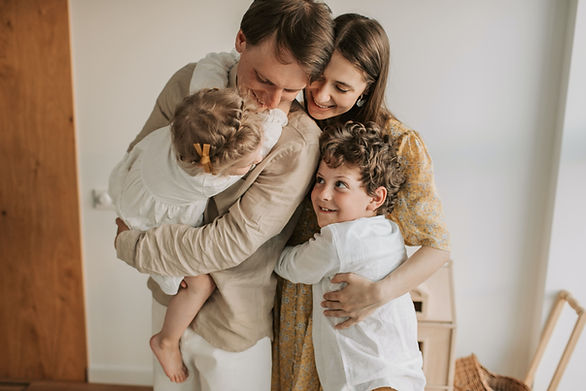
Raising kids is a complicated business, and it’s not always easy to figure out the best way to do things. With so many different ways to parent, it can be overwhelming to choose the one that fits your family. But don’t worry, I’m here to break down the most common parenting styles for you. Whether you’re a new mom or a seasoned pro, understanding these styles can shed some light on the path that’s right for you and your kids.
There are six main styles of parenting:
- authoritarian
- permissive
- authoritative
- attachment parenting
- positive
- unconditional

Authoritarian parenting
Authoritarian parenting is definitely on the stricter side. In this approach, parents set the rules and expect them to be followed without question. It’s a bit like a ‘my way or the highway’ attitude. The focus here is heavily on obedience and structure. Parents using this style often don’t spend much time explaining the reasons behind the rules. It’s more about following them because they’re the rules.
In terms of communication, it’s usually pretty one-sided. Parents make the decisions, and there’s not a lot of back-and-forth discussion. Kids are expected to listen and comply, rather than participate in the decision-making process.
Some children might do well under this kind of structure. They might find the clear expectations and boundaries reassuring. However, for others, this style can be challenging. It might lead to issues with self-esteem, as kids might feel they’re not heard or valued for their input. It can also impact their ability to make independent decisions. Without the opportunity to think through and discuss choices, kids might struggle with independence later on.
Authoritarian parenting can create an orderly environment, and in some cases, it can lead to kids excelling in structured, rule-based environments. But it’s important to balance the strictness with some level of warmth and open communication to ensure kids also develop confidence and self-worth.
Permissive parenting
Permissive parenting is like being your kid’s buddy more than their boss. You’re the type of parent who’s super relaxed about rules. Bedtime? Flexible. Snacks before dinner? Sure, why not. It’s all about giving your kid the freedom to make their own choices.
But here’s the thing: while it’s great to be the cool parent, not having enough rules can trip up your kids in the long run. They might not get the hang of things like following a schedule or doing chores because, at home, they’re used to just going with the flow.
Kids with permissive parents are usually pretty good at expressing themselves. They’re the ones who feel free to try new things and speak their minds. But, they might run into trouble when they have to deal with strict rules, like in school or on a sports team.
Authoritative parenting
This style is about setting clear rules and expectations while also being supportive and responsive to your kids’ needs. You’re firm but fair, and you make sure your kids understand why rules are in place. Kids raised this way often grow up feeling confident and independent.
In this style, you talk with your child a lot. It’s not a one-way street. You listen to their side, their ideas, and feelings. This helps your child feel respected and part of the decision-making process. It’s like having a mini-adult conversation with them.
When it comes to discipline, it’s more about teaching than just punishing. If they mess up, you help them understand what went wrong and how to fix it. It’s not about being harsh; it’s about helping them learn from their mistakes.
Encouragement is a big part of this style. You’re there to cheer them on, celebrating the good stuff and helping them through the tough times. This builds their confidence. They learn to be proud of what they can do and to keep trying, even when things are hard.
There’s also a lot of warmth in authoritative parenting. Your kids know they’re loved, no matter what. This makes them feel safe and secure. They’re more willing to try new things because they know you’ve got their back.
Kids who grow up with this kind of parenting often turn out pretty well. They’re usually good at school, get along with others, and know how to handle their emotions. They’re responsible and have a good sense of right and wrong.
It’s not the easiest way to parent, for sure. It takes a lot of effort to find that balance between being firm and being kind.
Attachment parenting
This style is all about creating a strong, emotional bond with your child. Think of it as being super tuned in to your child’s needs. It’s like being their emotional home base.
In attachment parenting, you’re all about closeness. This might mean lots of physical contact like baby-wearing, co-sleeping, or breastfeeding for as long as possible. But it’s not just about being physically close; it’s also about being emotionally available. You’re there to comfort and support your child whenever they need it.
The idea here is that this strong bond creates a secure, confident child. Kids who feel secure in their early years often grow up feeling more confident and independent. They know you’ve got their back, and that feeling helps them explore the world on their own terms.
Positive parenting
The focus is on positive behavior. Instead of punishing bad behavior, you encourage the good behavior you want to see. It’s about setting clear expectations and helping your child understand why certain behaviors are better than others. You’re teaching them, not just telling them what to do.
Communication is key in this style. You’re not just giving orders; you’re having conversations. You listen to your child’s feelings and thoughts, and you explain yours. This two-way street builds mutual respect and understanding.
Discipline in positive parenting is more about teaching than punishing. You might use time-outs, but they’re about giving your child time to think and learn from their actions, not just isolating them as punishment. The goal is to help your child learn self-control and responsibility.
Positive parenting builds a strong, trusting relationship between you and your child. Kids raised with this style often grow up feeling valued and heard. They learn to manage their emotions and solve problems in a healthy way.
Unconditional parenting
This style is all about showing your child love and acceptance, no matter what. It’s about making sure your kids know that your love for them doesn’t depend on their behavior or achievements. It’s love without strings attached.
Unconditional parenting means you’re focusing on loving and supporting your child for who they are, not what they do. It’s not about rewards or punishments. You’re not saying, “I love you because you got an A,” or “I’m disappointed because you didn’t clean your room.” Instead, you’re saying, “I love you, even when we have ups and downs.”
This approach is about understanding and empathy. You try to see things from your child’s perspective and validate their feelings. It’s not about dismissing their emotions but about guiding them through. You’re there to support them in figuring out their feelings and behaviors.
One key aspect of unconditional parenting is open and honest communication. You encourage your child to express themselves freely, without fear of judgment or punishment. This openness helps build a strong, trusting relationship.
Kids raised with unconditional parenting often feel more secure and confident. They know their value doesn’t come from grades, achievements, or behavior, but from who they are as individuals. This security can lead to better self-esteem and mental health.

What Parenting Style Do You Identify With?
I’m all in for authoritative parenting. It’s about setting those clear rules but doing it with a lot of heart and understanding. This way, kids learn how to be responsible and make good choices, but they also feel really supported and heard.
Authoritative parenting is a great approach for building confident, independent kids who know their opinions matter.
You should check out, Raising Good Humans, it’s an excellent read on parenting!



